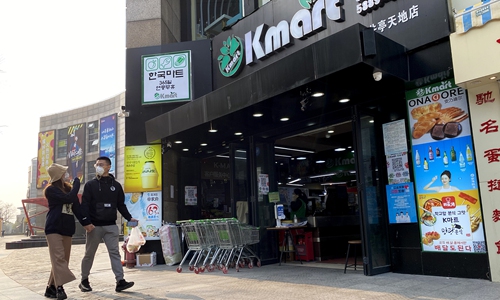HOME >> CHINA
Expats from Japan, South Korea appeal for concerted efforts against COVID-19
By GT staff reporters Source:Global Times Published: 2020/2/26 0:02:38

Two residents pass by a supermarket in a South Korean community in Shanghai on Tuesday. Photo: Chen Xia/GT
Japan faces a rapid expansion of COVID-19 if there are no special measures to prevent the spread of the deadly disease, a 36-year old Japanese national in Shanghai told the Global Times on Tuesday.
"There are many old people in Japan so there could be more deaths. I figure that the coronavirus would cause tens of thousands of infections and more than 500 deaths in Japan," he said.
As of 5 pm on Tuesday, Japan has reported a total of 853 confirmed cases, with 691 patients from the Diamond Princess cruise ship.
The Japanese national, who did not wish to be named, has lived in Shanghai for years and said that Japan should borrow some of China's strategies, such as adopting remote working, having a two-week quarantine period, and suspending school and gathering activities.
As the outbreak develops, severely hit areas in China, like Wuhan, Jingmen in Hubei Province and Wenzhou in East China's Zhejiang Province announced a lock down in the cities to prevent the novel coronavirus from spreading further.
Twenty seven-year-old Saki, who has been living in the Gubei community of Shanghai for more than a decade, said that such measures, together with screening and checking in airports, have helped contain the epidemic to some extent.
"I think the Japanese government needs to improve their efficiency in combating the outbreak," he said, adding that he hopes Japanese, like the Chinese do, can stay at home, wash their hands and wear masks to avoid infection.
Saki is impressed by the smooth order in the city amid the outbreak. "It is convenient to buy food here and there is no rushing and snatching in the supermarkets despite the epidemic," he said, noting that he feels safe in the city because of the timely information updates on the epidemic control measures
This was echoed by Yuma Kawagishi, a Japanese national who has lived in Shanghai for years and who also speaks highly of the country's resolution in cracking down on all kinds of rumors.
"I hope the Chinese and Japanese media can communicate more and share both sides' situations because the virus travels across the borders and the battle against the epidemic is for both countries," said Kawagishi.
Like Saki, Kawagishi values the Chinese government's strategy in dealing with the epidemic center in Hubei. "The strategy prevented the disease from spreading around the world. If the lockdown started earlier, the situation would be better."
South Korea raised its four-tier virus alert to the highest "red" level on Sunday as the virus infections soared over the past week. The country confirmed 84 more cases of COVID-19 on Tuesday, bringing the total number of infections to 977 and the death toll to ten.
South Korean national Han Min, who returned from his hometown Seongdong-gu in South Korea last week, told the Global Times that there are fewer people outdoors and taking public transportation, as two confirmed cases have been reported in Seongdong-gu already.
"I think, if South Korea wants to control the disease quickly, it is necessary to start quarantining as soon as possible, as China did, so that people can no longer be in contact with the infected people or virus carriers," he said.
"I think it's not just South Korea and China that need to work together to fight the epidemic," Han noted, appealing to people around the world to unite against the coronavirus.
"South Korea is getting worse. The masks are not available, just like China at the beginning," Alan Park, a South Korean national told the Global Times on Tuesday.
Park said that China should be "getting better now" as the measures taken by the government are effective. "The registering policy to go in and out of communities is effective. It makes me feel safe," he said.
Park Yun-shi, a South Korean national in Shanghai, also told the Global Times that whenever he enters the compound he needs to provide a permit.
"The coronavirus is under better control in China than in foreign countries. And China leads the world in developing medicines against the disease," he said.
As of Monday, China's daily output of nucleic acid test kits reached 1.7 million units and virus antibody test kits reached 350,000 units according to the National Medical Products Administration.
Posted in: SOCIETY